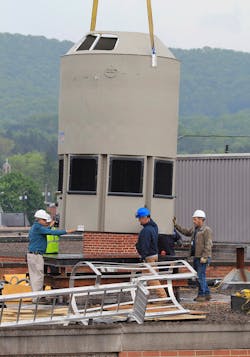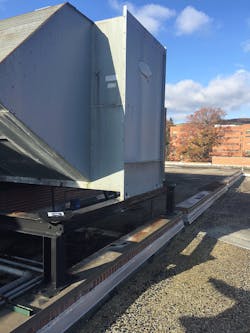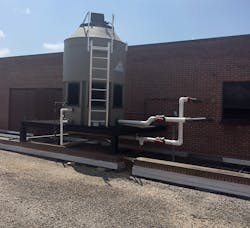Case Study by Delta Cooling Towers
When the time comes to replace a cooling tower, all too often the recommendation is to source an identical replacement. Which is ironic because most people wouldn’t settle for old, outdated technology when buying a TV or cell phone. The same logic holds true for HVAC equipment. With cooling tower technologies constantly advancing, it makes sense to research what cutting edge options offer the biggest return on your investment.
Recently, one institution in Maryland received some valuable lessons on cooling tower systems that helped it to avoid selecting troublesome technologies in favor of new innovative solutions that provide a much longer service life along with significant, ongoing operational savings. A first-hand examination of the manufacturing process for engineered plastic convinced both buyers to opt out of the repeated cycle of buying metal and instead to choose cooling towers constructed out of HDPE (high-density polyethylene).
In 2017, crews installed the new cooling tower with a one-piece, corrosion-proof shell.
For Frostburg State University (FSU), the time came in 2017 when they faced the task of replacing a failing cooling tower as part of an HVAC system overhaul. The system comfort-cools one of the campus dining halls during warm weather. Initially, the engineering and maintenance team examined two basic options: a costly switch to a new air-cooled system, or the purchase of another metal-clad cooling tower to replace the old rusted-out unit that they continually struggled to maintain.
In search of a better option, FSU’s in-house engineering staff turned to Casto Technical Services, Charleston WV and its Contracting Operations Manager, Paul Lancaster, who had assisted them on several projects over the years. Casto is a specialist in delivering mechanical services for commercial, institutional, and industrial building systems, including HVAC services, energy systems and automation systems.
A Technology Dilemma
Lancaster was quick to recognize that converting to an air-cooled system would require installing it on the roof of the cafeteria and equipping it with weight constraints, plus running piping outside the building – likely problematic in freezing weather – as well as an excessive hit to the budget. Not to mention the fact that air-cooled systems require 40-50% more energy consumption than water-cooled systems.
The existing cooling tower had become old and rusted and needed frequent maintenance.
On the other hand, replacing the existing system with another metal option would have inevitably led to more exorbitant cooling tower maintenance costs.
“The University’s staff was very uneasy about replacing the cooling tower with another metal-clad unit because of the ‘built-in’ deterioration of the tower due to rust and corrosion, along with high maintenance costs,” says Lancaster.
Even with the objection clearly stated, Lancaster notes that many of the service contractors bidding on the project were proposing doing just that – replacing the equipment with identical units – even in the face of frequent costly repairs and service interruptions.
Escaping Outdated Solutions
Recognizing the inherent weaknesses of traditional metal cooling towers – primarily their susceptibility to caustic environmental factors – Lancaster’s team pursued a more durable and affordable solution that is steadily transforming HVAC and industrial applications: the engineered plastic cooling tower. Constructed of high-density polyethylene (HDPE), this technology was first developed by Delta Cooling Towers, and has demonstrated unmatched durability and performance characteristics, even when compared with pricey stainless-steel models.
Because HDPE cooling towers are impervious to caustic environmental elements that continually attack metal units, ranging from marine air and airborne process exhausts to harsh gases from wastewater treatment. These engineered plastic cooling towers are unaffected by pH from water sources, including evaporation make-up water, and even the water treatment chemicals that attack metal towers from the inside out.
Lancaster says that the shortcoming of metal cooling towers cited by university in-house engineers were actually the strongest selling points of HDPE models.
“I gave them a brochure on HDPE cooling towers and they looked it over and said they loved the idea,” Lancaster explains. “As a result, we were able to proceed without a total re-design of the package; we simply did a replacement, which kept the costs much lower. And by incorporating the HDPE technology, there will be very little maintenance, so we created an optimum solution that would last for a long time to come.”
Research drove the University to choose new cooling towers constructed out of HDPE (high-density polyethylene).
The cooling tower that Casto and FSU settled on was a Delta Paragon model with 200 cooling tons.
A Firsthand Look
Located in Frostburg MD, the university has an enrollment of approximately 5,400 students on a 40-acre campus. It also happens to be within driving distance to the Delta’s Philippi WV manufacturing and assembly plant. So, Lancaster and some of the team took a field trip to the facility to see firsthand the manufacturing process of the one-piece, corrosion-proof shell.
“I’ve been in this business for 38 years, and I know a good solution when I see one. They showed us all the steps in the manufacturing of these cooling towers and pointed out the variety of options. It was well worth the visit,” says Lancaster.
For more information, contact Delta Cooling Towers, Inc.; (800) 289.3358; email: [email protected]; or visit the website: www.deltacooling.com.












